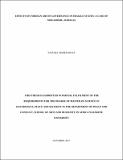Effects of Foreign Aid on Governance in Fragile States: A Case of Mogadishu, Somalia

View/
Date
2017Author
Musa, Fatuma Ahmed
Type
ThesisLanguage
enMetadata
Show full item recordAbstract
Somalia has been and is still greatly supported by foreign aid since the fall of its government in 1991 and hundreds of billions of dollars have been given to the country in form of humanitarian and developmental support. However, like all fragile and fractured governments Somalia has suffered from the failures in leadership and use of foreign aid, because of overt corruption and ethos of neopatrimonialism. The purpose of the study was to determine the relationship between foreign aid and governance; to evaluate the effectiveness of Somali local institutions in management of foreign aid; to investigate appropriate policies and strategies to better manage foreign aid for maximum development in Mogadishu. The study used a descriptive research design. The sampling technique for the study was purposive sampling technique in which 150 individuals working in the government institutions in Mogadishu, general Somali citizens as well as staff members of the leading donor agencies Sweden –SIDA (Swedish International Development Cooperation), European Union (EU) and Government of Japan were sampled for the study. The study used semi-structured questionnaires to collect the data. Focus group discussions were also held with sampled individuals from the general public, donors and government representatives. The data was analyzed using Statistical Package for Social Scientists (SPSS) and both descriptive as well as inferential statistics was used to collect the data. The study found that Mogadishu received foreign aid from different donors however the level of satisfaction in which government institutions managed foreign aid for developmental purposes was low. The study also found out that government institutions lacked the capacity to manage foreign aid in Mogadishu. The study furthers finds that there is dissatisfaction with ongoing developmental programs funded by foreign aid in Mogadishu. The study further argues that the corporation between the government and the donor community is not very effective. Hence, lack of better management of foreign aid due to weak governance institutions in place. The study makes the following recommendations. One, building capacity of government institutions to better manage foreign aid within the country. Two, the study recommends regulation of flow of foreign aid within the country while encouraging the government to invest in other resources within its reach as other sources of revenue. It further recommends the formulation of effective policies and strategies to ensure better management of foreign aid. Such future research should aim at bringing new insight on the effects of foreign aid on governance in Somalia.
Publisher
Africa Nazarene University
